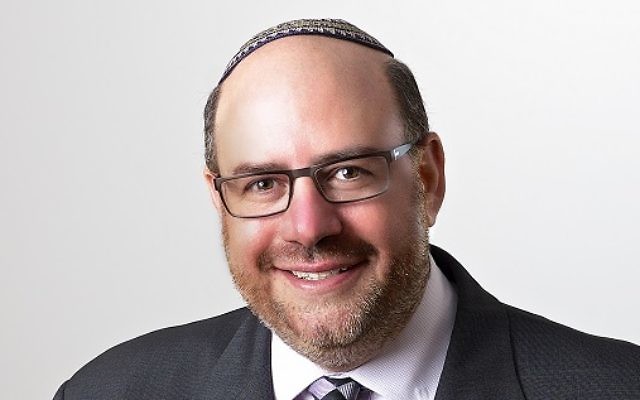USCJ Adapts to Future
The organization formerly known as the United Synagogue of Conservative Judaism, is holding its biennial convention in Atlanta Dec. 1 to 5.
USCJ, the organization formally and formerly known as the United Synagogue of Conservative Judaism, is holding its biennial convention at the Marriott Marquis in downtown Atlanta from Friday to Tuesday, Dec. 1 to 5. The organization brings a new logo and a new focus on kehilla (community) over two of the core words of its name, synagogue and conservative.
Rabbi Steven Wernick, USCJ’s CEO, visited member congregations Etz Chaim, Shearith Israel and Ahavath Achim in mid-September, and he and USCJ International President Margo Gold, an Ahavath Achim member, met with AJT Editor Michael Jacobs and correspondent Dave Schechter (great-grandson of Conservative movement founder Solomon Schechter) to discuss the changes in the 600-synagogue movement.
The rebranding is not about advertising, Rabbi Wernick said, but about aligning the organization’s activities around the experiences of its partners and its primary audience — not the Jews in the pews or those who might be drawn into the pews, but those serving on congregational boards, “the people that are building local communities and are looking for the resources to thrive at a time of significant paradigm shift.”
In business terms, he said, USCJ is a wholesaler serving the congregations, which are the retailers of Conservative Judaism.
While the word “conservative” causes problems these days, particularly for a Jewish community that is largely liberal in politics and religion, the Conservative Judaism name remains a vibrant path forward for Jews in North America and around the world, Rabbi Wernick said.
“An authentic and dynamic Judaism is a Conservative Judaism. It’s a Judaism that relishes the meeting point between tradition and change and understands that there’s tension there and needs to work through in thoughtful ways how we solve the problems of our generation and what’s the wisdom that our tradition can provide in doing that,” he said. “That’s Conservative Judaism. That’s still who we are.”
But in addition to the problematic meaning of “conservative,” USCJ found that “synagogue” wasn’t the best label for the network of Jewish communities it is building. Since crafting a strategic plan in 2011, the organization has preferred to use kehilla and its plural, kehillot, instead of synagogue.
“Synagogue is a building; kehilla is a community. And we wanted to refocus people’s attentions on relationships and not on structures,” Rabbi Wernick said. “By going to USCJ rather than United Synagogue, it allows us to broaden our definition as a platform rather than just a membership organization of synagogue buildings.”
Fixed buildings don’t fit the reality for non-Orthodox Jews today, who tend not to marry and start families until their 30s. From ages 18 to 35, Rabbi Wernick said, those Jews move around like nomads. “I don’t think we can reasonably expect that nomads are going to come into the rooted communities,” he said. “We have to be more like the Jews in the wilderness. We have to build a mishkan that can travel with them through those years rather than a beit mikdash that’s standing in Jerusalem.”
Much of the effort toward building that agile Judaism focuses on the teen years “because we understand teen engagement to be critical for the success of the Jewish people,” the rabbi said. USCJ is committed to doubling its USY staff in the field and cutting the cost of participation to dramatically increase the number of teens reached.
USCJ also is emphasizing innovation. Rabbi Wernick cited Etz Chaim’s new outdoor sanctuary, bringing the camp experience to the shul, as an exciting example that needs to be followed and shared across the network.
He said, “I want USCJ to be a reflective organization that’s constantly gathering data, asking questions about that data, struggling to understand what it means and therefore constantly adapting and growing.”
USY Investigation
USCJ is looking into allegations of sexual misconduct in the 1970s by a longtime staffer of the USY youth group, USCJ revealed in the week leading up to its biennial.
The allegations came to light through Facebook, USCJ CEO Rabbi Steven Wernick told The Jewish Week in New York.
To help confirm or refute what was reported about its most prominent and successful program, USCJ has established a hotline (212-533-7813) and a dedicated email address (confidential@uscj.org) for the use of any USY participant who may have been a victim.





comments